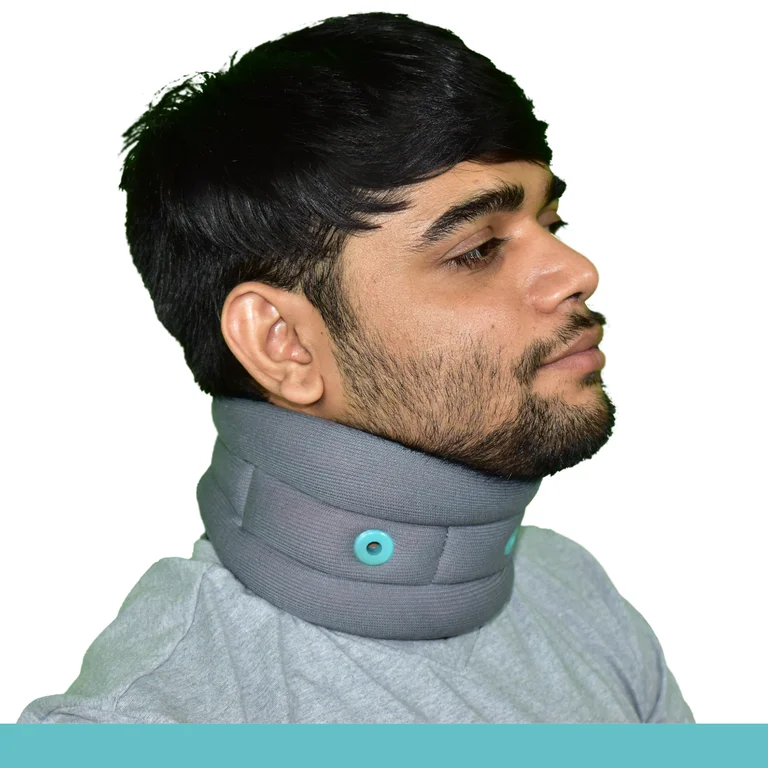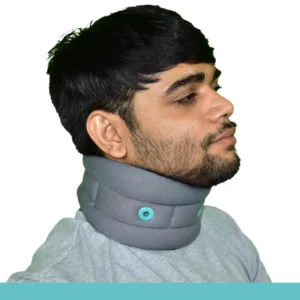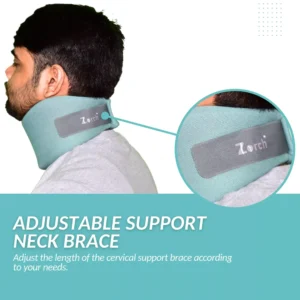Currently Empty: ₹0.00

Cervical Collar Uses and Benefits for Neck Pain Relief
Neck pain can strike anyone, anytime. Whether it’s from sleeping wrong, an injury, or long hours at your desk, that nagging stiffness in your neck can seriously affect your day. That’s where understanding cervical collar uses becomes super important. Cervical collars, often called neck braces, offer more than just support – they can play a vital role in healing and pain management.
Let’s break it all down in a simple and friendly way, along with expert product recommendations from Zorch, a trusted name in neck support products.
Understanding Neck Pain and Its Causes
Before we talk about neck braces, let’s understand the root of the problem. Neck pain can come from:
- Poor posture while using smartphones or computers
- Sudden injuries, like whiplash from an accident
- Degenerative issues, such as cervical spondylosis
Post-operative recovery after spine or disc surgery
What Is a Neck Collar and Its Purpose
A neck collar, or cervical collar, is a medical device worn around the neck to support the cervical spine and reduce movement. It helps:
- Prevent further injury
- Support muscles and tendons
- Aid in pain relief by reducing pressure
Types of Neck Support Devices
There are mainly two types:
- Soft Cervical Collars – flexible and made of foam, great for mild pain or strain
- Rigid Collars – more supportive, used after serious injuries or surgeries
When Is a Cervical Collar Recommended
Doctors usually recommend neck braces in cases such as:
- Mild to moderate neck strains or sprains
- Post-surgical healing
- Cervical spine injuries
- Chronic pain due to spondylitis or herniated disc
Exploring Cervical Collar Uses
Let’s dive into how a cervical collar actually helps in real life.
Pain Relief and Muscle Support
The main use is neck pain relief. The collar limits neck movement, which allows muscles to relax and heal. This is especially helpful if you’ve strained your neck muscles or suffer from cervical spondylosis.
Post‑Accident or Injury Stabilisation
If you’ve experienced a fall, car accident, or sports injury, wearing a cervical collar stabilises the neck. This prevents sudden movements that could worsen the injury.
Post‑Surgery Recovery
After neck or spine surgery, a cervical collar helps keep your neck in the right position while tissues heal. This speeds up recovery and lowers the risk of complications.
How to Wear Cervical Collar Correctly
Wearing your neck collar the right way makes all the difference. Let’s learn how to wear cervical collar step by step.
Step‑by‑Step Guide
- Clean and dry your neck area.
- Place the collar snugly around your neck, with the chin properly resting on the chin rest.
- Ensure the velcro is fastened securely, but not too tight – you should be able to breathe and swallow comfortably.
- Check for balance – the collar should not tilt your head sideways.
Common Pitfalls to Avoid
- Wearing it too loose or too tight
- Using it for longer than prescribed
- Ignoring signs of discomfort or rashes
- Not consulting your doctor for proper sizing
Zorch Product Recommendations
Zorch: Cervical Collar Spl with Support
If you’re looking for reliable, doctor-recommended neck braces, we highly recommend these two products from Zorch.
Zorch Soft Cervical Collar

This is perfect for mild pain or neck strain. It’s comfortable, made of breathable fabric, and easy to wear all day long.
- Best for: office workers, tech users, mild muscle stiffness
- Comfortable fit with adjustable velcro
- Breathable material for long-time use
Try the trusted soft cervical collar for everyday support and gentle pain relief.
Zorch Cervical Collar Spl with Support

A more robust option, this product offers added support, especially useful for post-surgical recovery or injuries.
- Firm structure for maximum support
- Ideal after trauma or spine surgery
- Doctor-recommended for cervical spine immobilisation
Click here to shop the best hard cervical collar for superior neck support and healing.
Tips for Safe and Effective Use
To get the most from your neck brace, follow these safety tips.
Duration of Wear
- Short-term use: 2-3 hours a day for mild pain
- Post-surgery or injury: As advised by your doctor
- Never sleep with the collar unless recommended
When to Consult a Doctor
- If pain doesn’t reduce within a few days
- If you feel numbness or tingling in arms
- If the collar causes irritation or discomfort
FAQs about Cervical Collar Uses
How long should I wear a cervical collar for neck pain?
You should wear it only as prescribed. For mild pain, 2-3 hours a day is enough. For surgery or injury, follow your doctor’s advice
Can I sleep with a cervical collar on?
Only if your doctor recommends it. Most collars are not designed for night use unless they are rigid or custom-mad
Will a cervical collar cure my neck pain?
It won’t cure the root cause but it supports healing and gives pain relief. Combine it with physiotherapy or posture changes for full recovery.
Is the Zorch Soft Cervical Collar good for daily use?
Yes, it’s ideal for daily use, especially for people with mild neck strain from desk jobs or mobile overuse.
How do I know if my collar fits properly?
It should hold your neck straight without squeezing. You should be able to talk, breathe, and swallow comfortably.
When should I choose a rigid collar over a soft one?
Rigid collars are better after serious injuries or surgeries. Always consult a doctor before choosing one.
Conclusion
Understanding cervical collar uses can truly transform how you deal with neck pain. Whether it’s a minor ache or part of your post-surgical care, the right neck support can make recovery smoother and quicker. Just remember to use it wisely, follow your doctor’s advice, and invest in quality products like the Zorch Soft Cervical Collar and Zorch Cervical Collar Spl with Support.




